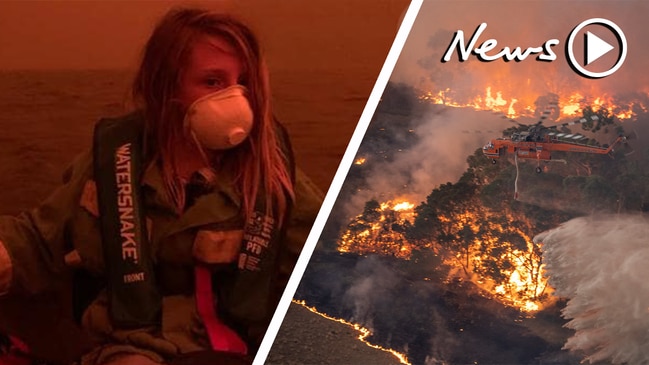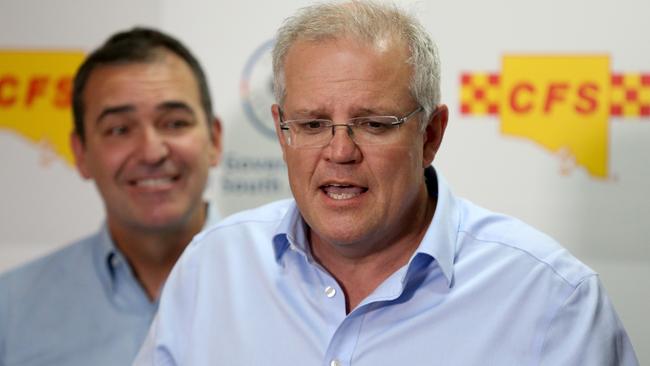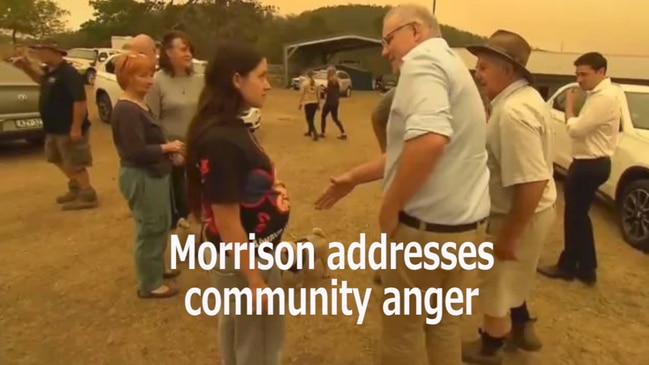Daniel Wills: Premier Steven Marshall stayed on the job as SA burned, and redefined him public image by keeping cool in the crisis
Political leaders don’t hold a hose, but their communities still want them on the job when natural disasters strike. The responses from our Premier and PM couldn’t be more different.

Opinion
Don't miss out on the headlines from Opinion. Followed categories will be added to My News.
- SA Premier Steven Marshall cancels Christmas Holiday amid fires
- Prizes, discounts, freebies: Check out the latest subscriber rewards
Bushfires are confusing, menacing and threatening events.
Fear and panic can rage with a ferocity that mirrors the flames, and the legacy of grief lasts longer and can go deeper than the material losses.
Prime Minister Scott Morrison and Premier Steven Marshall, as political leaders, have found themselves in similar situations as their constituencies burn.
But the two will, eventually after the embers finally die away, emerge from this gruelling natural disaster with very different images.
It should be stated clearly that the political dimensions of infernos that have ripped across the country and claimed at most recent count one life and about 90 homes in SA as well as at least 20 people and 1000 properties nationwide, shrink into almost microscopic relevance compared to this immense human suffering.
But in times of shared disaster, when communities feel powerless to do anything to overcome the power of nature or actions of deranged individuals, political leaders are always called on to search for some clarity.
Overseas, NZ Prime Minister Jacinda Ardern became consoler-in-chief after the still-incomprehensible gunning down of 51 people, including children and worshippers.
At home, former Queensland premier Anna Bligh’s tears over terrible floods and declaration that “We are Queenslanders. We’re the people that they breed tough, north of the border.”
“We’re the ones that they knock down, and we get up again” started that state’s rebuilding.

Mr Morrison spoke some truth with his undoubtedly tin-eared quip in the early stages of the bushfire crisis when saying, on the phone from Hawaii: “I don’t hold a hose, mate, and I don’t sit in a control room”.
On the frontline, no, there was nothing he could do. Nor could he immediately command the weather, or strip away climate change effects that make these sorts of catastrophic fire conditions increasingly likely.
And politicians are humans too, who need time with their families.
But he clearly misunderstood that far less practical but nonetheless important function of political leadership, which is to be there in the tough times and project a sense that things are under control and everything that can be done, will be.
Far closer to home, Mr Marshall similarly did not hold a hose. Even he would claim to have shown even a fraction of the heroics of CFS volunteers who have been literally risking their lives for nothing in return but the fulfilment of having done what they can to help a neighbour.
He has done what little he can, which has been to release a little money quickly to people who lost much of what mattered to them in the world. And he’s been there to offer a calm voice in times of panic.
In a move that drew immediate comparisons with Mr Morrison, Mr Marshall at first delayed and then cut significantly shorter his own planned Christmas trip with family.
It appeared to speed up the bureaucratic responses, including getting the right people on the ground quickly to begin the rebuild.
And much has been done with little fanfare, and Mr Marshall’s only media posts being the primary updates from remote locations rather than press conferences from the fire ground which could complicate or interrupt relief efforts.

During his time as Liberal leader, Mr Marshall has often faced criticism that he’s been too low-profile, absent or missing in action.
It’s been commonly said that he’s not seen very much or that the public feels it doesn’t often doesn’t hear from him.
While his policies might be known, and tested through the pressure of two elections, his true personality still remains a mystery to many.
There will be probably be no news story in SA that gets more attention this year than the fires have already, and the long clean-up to follow.
Those will be the most important developments to come.
But Mr Morrison already looks politically diminished. Having won the federal election last year with the pitch that he was just an average bloke focused on practical things, his image has flipped to a missing leader sipping cocktails as the country burned. The images of him being given the cold shoulder and urged to get out of town when finally arriving in fire-ravaged towns this week have been belittling and humiliating.
Mr Marshall hasn’t done much different from former premiers Jay Weatherill or Mike Rann before him. He’s showed up, largely stayed out of the way of the firefighters and done the talking for them so they can get on with what they’re best at.
But the contrast with Mr Morrison’s PR bungling has shown just how important that really can be.
Mr Marshall will emerge from these weeks as a more authoritative leader who’s shown he can be in control and calm where others lose composure.
It’s not why he did it, but that result is true nonetheless.
